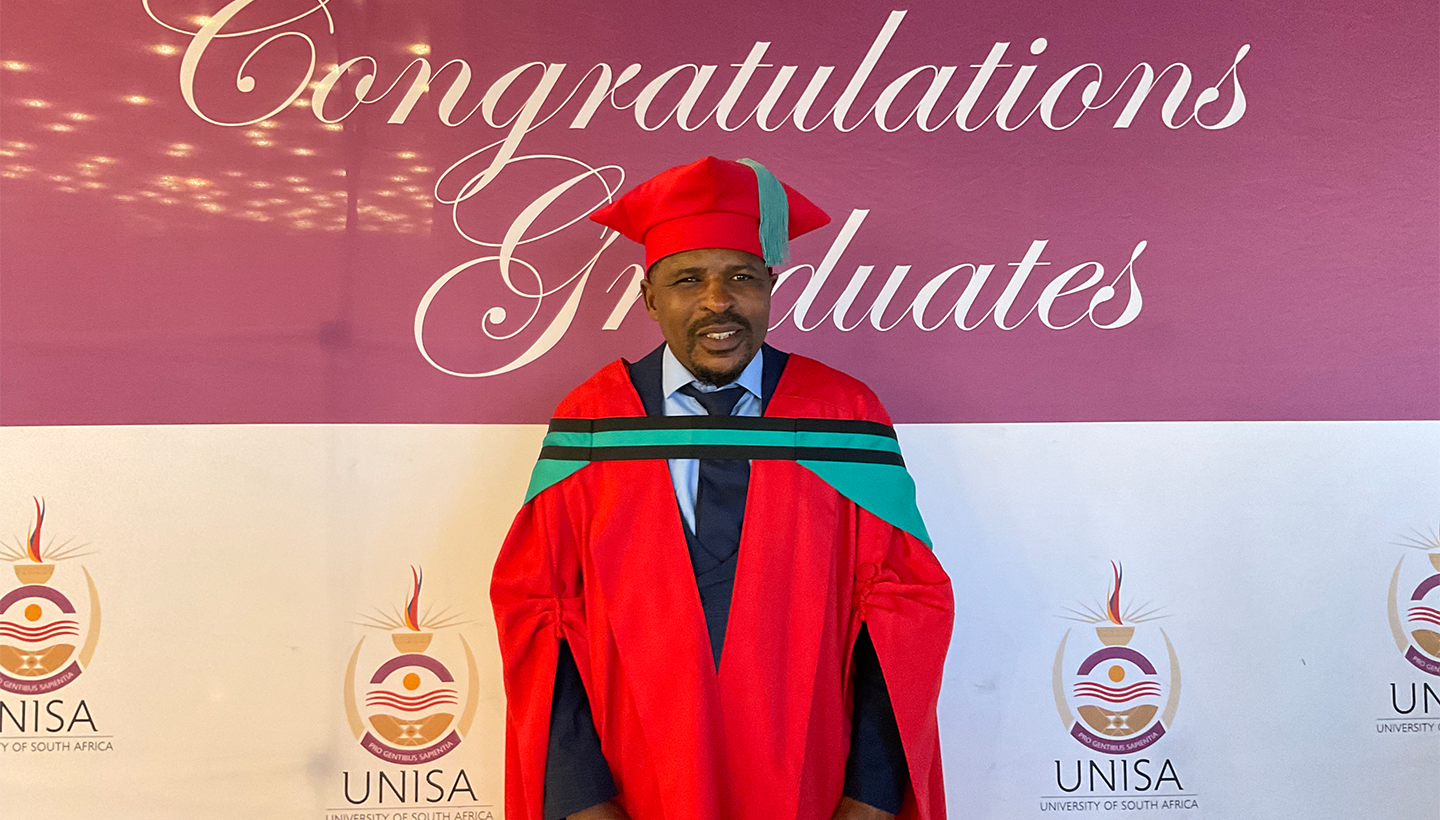News & Events
Unisa alumnus lauds Recognition of Prior Learning as enabler to academic achievement

Dr Mahao Francis Johane, Unisa alumnus
Through the university’s Recognition of Prior Learning (RPL), Dr Mahao Francis Johane reached his academic dream of obtaining a Doctoral degree in Education, under Unisa’s College of Education (CEDU), at the recent Autumn graduations period. His doctoral thesis focused on “Youth participation in development programmes: Implications for community development in Lesotho”.
Born and bred in Thaba-Tseka, Lesotho, in a family of eight siblings, Johane was raised by parents with contrasting parental values. He says that his father was deeply rooted in livestock farming as a way of life, and his mother had unwavering commitment to the importance of education. He explains: “As a result, me and my brothers took turns attending school and looking after livestock.” Johane adds that during examination periods, their mother would look after the animals, ensuring that her sons focused on their studies.
After completing school, Johane says that he was withdrawn from formal education to focus on the family livestock. “However,” he continues, “I was announced among the top ten performers from the previous year’s national examinations.” He notes that the recognition prompted his educated uncle to convince his father to reconsider his decision to withdraw Johane from pursuing his studies.
Despite the academic challenges he faced, Johane persevered and eventually earned both a bachelor’s degree and a master’s degree, setting the foundation for a lifelong commitment to youth development and academic excellence. In 2022, Johane applied for a doctoral degree at Unisa, but he did not qualify due to his master’s degree being in a different field. However, upon receiving the relevant advice on the process of RPL, his application was successful. The RPL process permits students to gain credits within formal qualifications offered by Unisa based on the level and extent of their knowledge and work experience, which are measured against prescribed learning outcomes. He attests: “Going through the transformative process of RPL opened the doors to my academic achievement that I thought were out of reach for me.”
Johane states that from a young age, he was actively involved in youth activism through various movements in Lesotho. “These platforms nurtured and deepened my belief in youth empowerment, and the importance of developmental, non-partisan engagement in community issues, as well as my passion for youth advocacy,” he says.
Professionally, Johane held various roles in his country, centred on youth and community development, including leadership roles, such as senior officer for Youth Development in the Ministry of Gender, Youth, Sports and Recreation. He also served as the programme director at SOS Children’s Villages, and the national coordinator for the Youth Volunteer Corps Project, among others. “I am also a certified youth development practitioner through both the American-based Youth Intervention Programs Association and Zambia’s Centre for Youth Development Services,” he notes. “These experiences and acquired knowledge further inspired me to pursue a doctoral degree.”
Johane states that he is appreciative of his doctoral supervisor, Professor Lineo Johnson, from CEDU’s Department of Adult Community and Continuing Education, for her commitment, mentorship, guidance and support throughout his journey. He further affirms: “Unisa provided unwavering support in my journey, including through postgraduate support workshops that helped me to navigate the research process, thesis development, and daily academic requirements.” Johane further appreciates the university’s commitment to inclusivity, as well as its flexibility as an open distance and e-learning institution.
Additionally, he encourages the university to create more awareness around the RPL process to ensure seamless and improved accessibility for students. “Streamlining the process and offering clearer guidance could encourage even broader participation and benefit more individuals with rich professional knowledge and experience, like me.”
Johane urges anyone considering a similar academic path, particularly through RPL, to never underestimate the value of their lived knowledge and professional experiences. He concludes: “Unisa recognises that knowledge comes in many forms - if you are passionate, committed, and informed, opportunities will follow.”
#Unisa150andBeyond #CircleofExcellence
* By Freddy Abilio Mlambo, Acting Marketing and Communication Specialist, College of Education
Publish date: 2025/07/15
